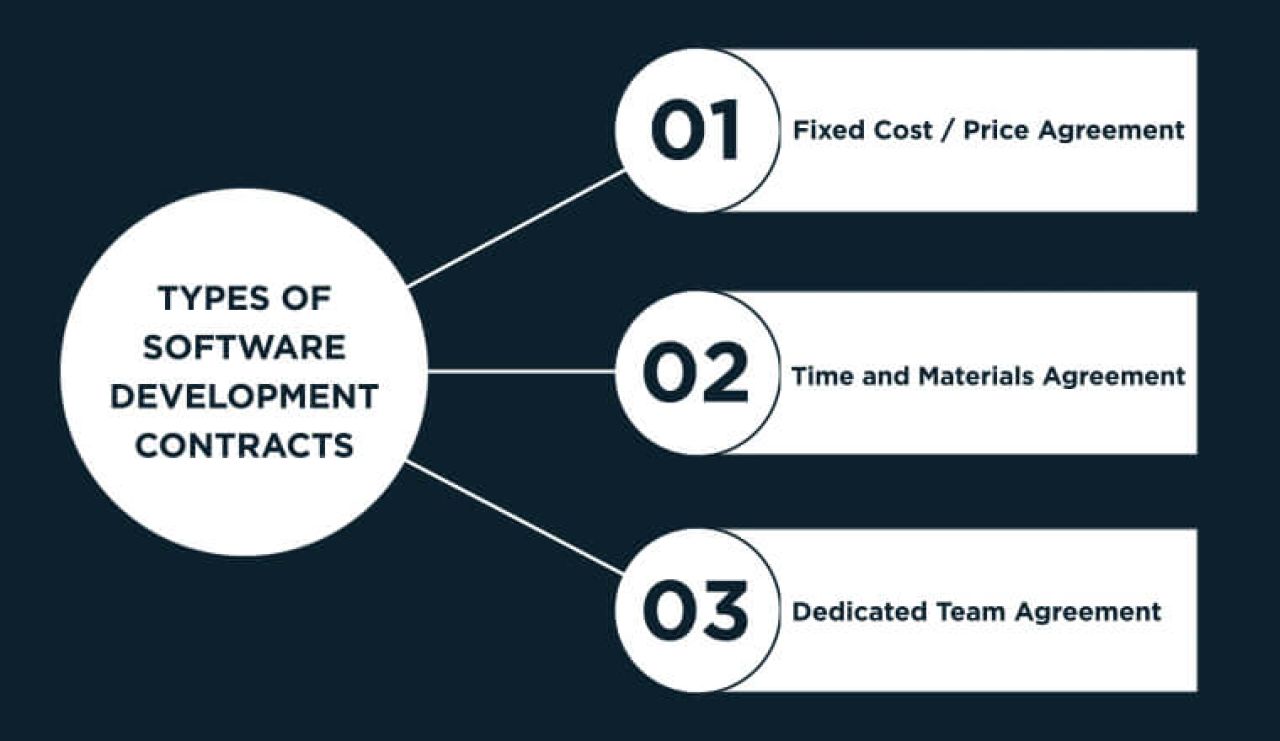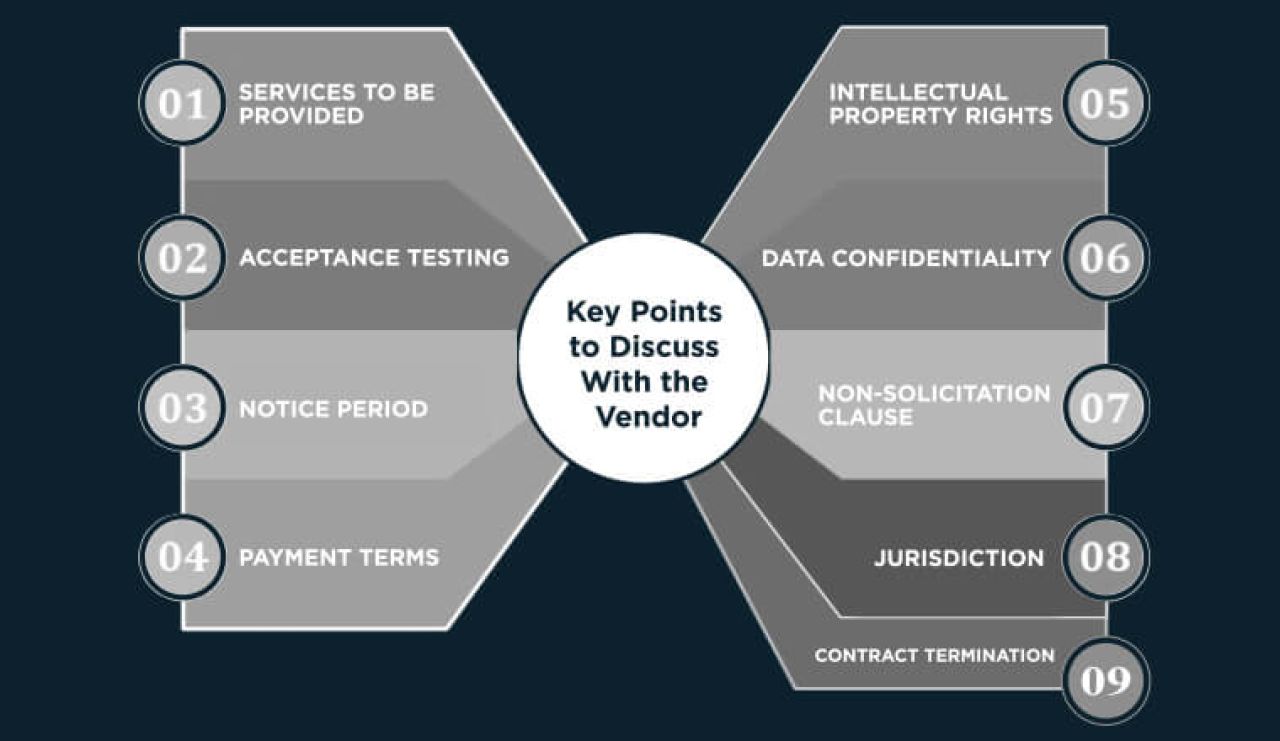Software Development Agreement Checklist: Avoiding Risks

Building a good relationship is critical when collaborating with a software development company. Project terms, timelines, prepayments, and data security are a few issues that need to be addressed from the outset.
A software development agreement benefits the relationship between a software development company and a client.
Lack of communication and expectations lead to intellectual property losses, financial errors, data leaks, and poor product quality. Details left out of a software development agreement will cost you money.
As a client, it is beneficial to learn about software development agreements before you outsource your project to a new vendor. Signing a software development partnership agreement excludes the misunderstandings in the partnership.
This article explores the essential points in signing a software development agreement to eliminate potential risks. We touch on the following topics:
- Types of software development contracts.
- The Software Development Agreement Checklist: Nine Points to Discuss With the Vendor.
- VironIT’s software development agreement template.
Types Of Software Development Agreements
Software development agreements establish the relationship between a client and a vendor and ensure mutual expectations and duties.
The software development agreement includes such essential points as the project’s scope and cost, timeframes and warranties, responsibilities, privacy and security, and more. Every project has unique requirements and must be negotiated accordingly.
Depending on your project and your requirements, there are three types of software development agreements. You may pick one based on your project’s specifications.

Fixed Cost Agreement
A fixed cost agreement addresses the terms, scope, volume of work, and price of a project. A unique feature of the fixed cost agreement is that the cost to complete the project is agreed to by the developers regardless of whether the development strategy is changed or not. The developers may change the development strategy but may not go over the fixed cost established in the agreement.
Pros:
- The client pays a clear and fixed sum of money.
- The technology used by the developers is familiar to the client.
- The project is straightforward, and the development process is clear.
Cons:
- There is no flexibility in the development process.
- Every correction costs extra money.
- This type of agreement is not suitable for large or complicated projects.
Who can use it:
- Entrepreneurs with short-term projects or limited budgets
- Companies that are strict with documentation
- Software development companies using waterfall methodology
Time and Materials Agreement
This type of agreement is most popular with software development companies. A time and materials agreement is used when it is challenging to define the project’s budget or timeline due to complexity. The client only pays for the developers’ working hours to build the software product.
A time and materials agreement allows the project’s scope or goals to change and the team of developers to grow.
Pros:
- There are no deadlines, so the project’s timeline is flexible.
- The developers are open to sudden changes and new ideas during the project.
- The client can control the development process.
- The client’s soft requirements may change while building the software product.
Cons:
- It is unclear how long the development process will last.
- The project cost may change by the end of the development process.
Who can use it:
- Business owners who need to update or incorporate changes into an existing software product
- Entrepreneurs who want to create a new product by realizing their ideas by the developers
- Projects with unclear time limits
- Short-term projects up to two months
- When the client is open to new ideas
- When the client can pay more than previously estimated
Dedicated Team Agreement
A dedicated team agreement is signed when the client hires a team of developers exclusively for his project. The team doesn’t work on any other software product in this case. According to the contract conditions, the client pays the salary to the dedicated team member and some fee to the vendor. As an option, the client and the vendor can agree on a weekly or monthly fixed budget.
Pros:
- The conditions are agile and changeable.
- The company has a flexible budget.
- The developing team works only on the client’s project.
- The business owner is involved in the development process.
Cons:
- The time frames of the project’s release are unknown.
- Doesn’t fit small projects.
Who can use it:
- Companies that have vast and complicated projects
- Business owners whose projects last more than three months
- Companies that want a full-time team to work
- Entrepreneurs who want non-standard software products
Before starting negotiations with a new vendor, analyze your goals and needs, the project terms, the budget you are ready to spend, and what you expect from the vendor. This information will help you to understand what kind of agreement needs to be signed.
To help you, we’ve made a software development agreement checklist with nine key points to discuss with a vendor.
The Software Development Agreement Checklist: Nine Points to Discuss With the Vendor
Once you have decided to outsource your project to a software development company, discuss the following points with the vendor and include them in the software development agreement. This checklist will help prevent misunderstandings and protect your rights.

1. Services to be provided
Specify the details of the project. Provide a detailed explanation of the goals, scope, and requirements. Discuss the project plan, the services to be performed, and the terms and conditions.
Note! Consider including the following:
- The client may introduce amendments to the scope of the project.
- Any changes offered by either party should be provided in written form, be described in detail, and show the effect on cost and the time to completion.
2. Acceptance testing
Testing is usually performed at the end of every development cycle to check if the current version of the product satisfies the client. Decide with the vendor who will conduct the acceptance testing procedure and put this in your software development agreement. Important issues are:
- the duration of testing,
- how the results will be delivered, and
- the process of implementing changes if bugs or failures occur.
3. Notice period
A custom software development agreement should include stipulations regarding notice periods. Disruptions to the development process result in higher costs and delayed completion. Therefore, it’s essential to indicate time frames for notice periods in the software development agreement.
4. Payment terms
Payment terms are essential in software development negotiations that need particular attention. Before signing the software development agreement, determine your vendor payment conditions, including:
- hourly or weekly rates,
- when calculations and invoices must be issued,
- payment deadlines,
- inclusion of taxes or bank transfer commissions and fees,
- penalties for overdue or unpaid invoices, and
- additional payments.
5. Intellectual property rights
The software development agreement must include information about intellectual property rights to avoid conflict, especially around the ownership of unused source code, ideas, designs, and other materials created for your project. The software product, either in the development process or completed, always belongs to the client.
To further protect intellectual property rights, you can sign a Non-Disclosure Agreement (NDA) or a Proprietary Rights Agreement.
- Signing an NDA guarantees that all intellectual data, such as ideas, solutions, and products, will be secured from stealing or publishing by the other party. Moreover, this agreement keeps all information associated with the project confidential, including discussions.
- A Proprietary Rights Agreement states your ownership of all intellectual property under the software development agreement.
6. Data confidentiality
The development process requires access to the client’s internal information. Therefore, data confidentiality is critical. Specify what data is private or proprietary and describe the penalties in case of disclosure in the software development agreement.
7. Non-solicitation clause
A software development agreement should contain a clause that prohibits the vendor from soliciting employees or clients from the client’s company. This is especially important when the vendor can access the client’s data.
8. Jurisdiction
The IT outsourcing market is international. The client and the vendor are usually based in different countries. This means that each of the parties submits to their local laws, which may cause issues in case of litigation. It is best to negotiate with the vendor which jurisdiction will regulate the software development agreement.
9. Contract termination
Sometimes the client breaks the contract to continue the development in-house or change vendors. Discuss the terms of the software development agreement with the vendor.
The software development process is performed in close cooperation and requires frequent communication. When the vendor presents the agreement, most clients sign it without any discussion, leading to misinterpretations and conflicts down the road.
It is essential to examine the agreement, discuss every point and make appropriate corrections before the start of the project.
VironIT’s Software Development Contract Template
VironIT is an outsourcing software development company with high-skilled developing teams that have experience in over 600 projects.
Our Project Managers manage development processes and help clients with decisions like choosing the proper custom software development agreement and discussing each agreement section.
In VironIT, we use two types of software development agreements:
- Time and Materials Agreement
- Dedicated Team Agreement
Depending on the type of software development agreement, the critical points that we discuss with our potential partners include:
- services provided,
- acceptance testing,
- payment terms,
- intellectual property rights, and
- data confidentiality.
Please get in touch to discover the best options for your project. We are ready for negotiations on every point of the service agreement for a fruitful partnership.
Conclusion
Hiring a software development company is a serious investment in a client’s project outcome. Neglecting software development agreement negotiations may result in:
- unexpected extra payments,
- taxes and penalties,
- the loss of intellectual property or internal data disclosure, and
- solicitation.
Following our software development agreement checklist will prevent mistakes and safeguard your project.





Comments are closed.